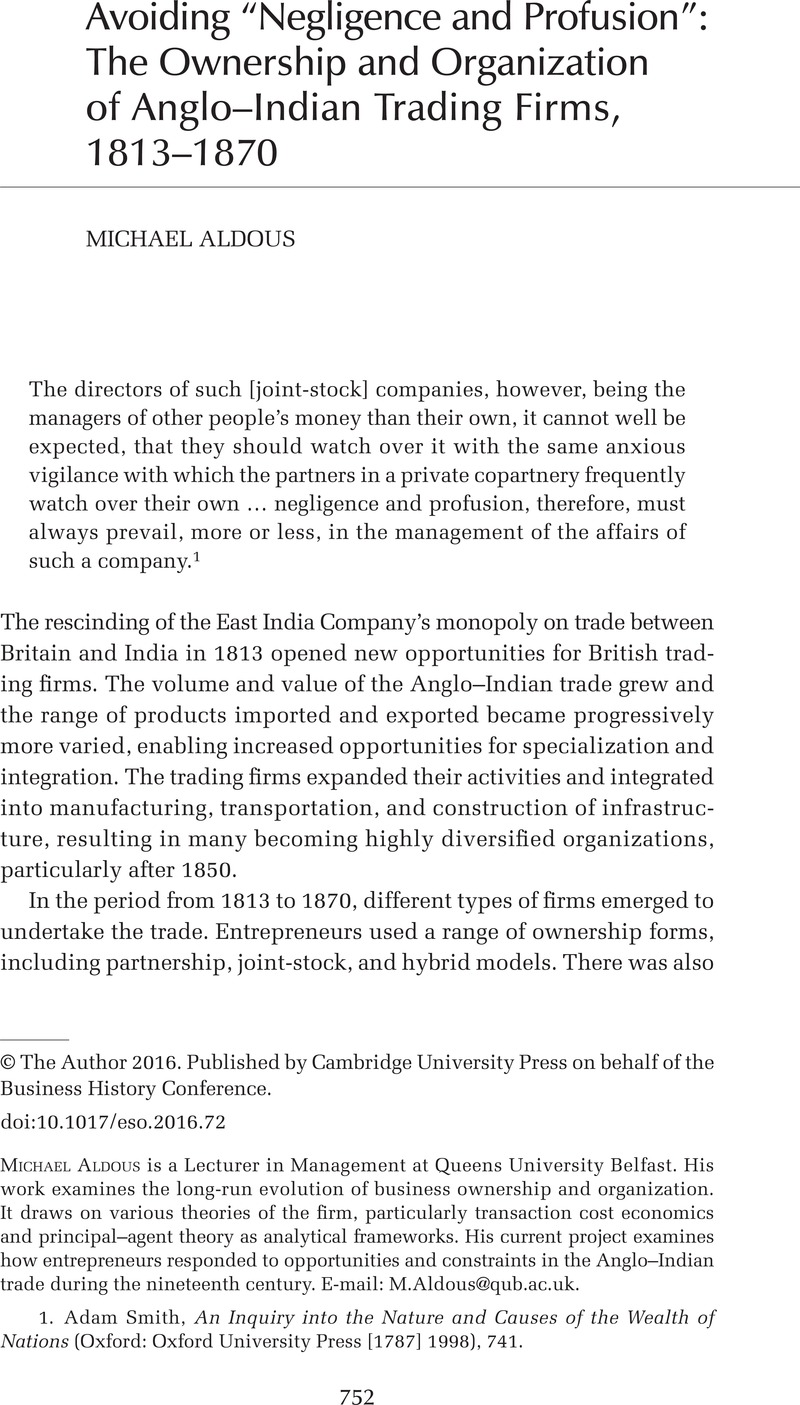Published online by Cambridge University Press: 14 November 2016

1. Adam Smith, An Inquiry into the Nature and Causes of the Wealth of Nations (Oxford: Oxford University Press [1787] 1998), 741.
2. In Britain, the passage of the Companies Act of 1844, the Limited Liability Act of 1855, and the Joint-Stock Companies Act of 1856 all lowered the costs of incorporation. In India, similar acts were passed in 1850 and 1857.
3. Stanley Chapman, Merchant Enterprise in Britain: From the Industrial Revolution to World War I (Cambridge: Cambridge University Press, 2004); Geoffrey Jones, Merchants to Multinationals: British Trading Companies in the 19th and 20th Centuries (Oxford: Oxford University Press, 2000).
4. Maria Misra, Business, Race, and Politics in British India, c. 1850–1960 (Oxford: Clarendon, 1999), 4, estimated that 75 percent of all Indian industrial capital was controlled by managing agents in the early twentieth century.
5. Alfred Chandler, The Visible Hand: Managerial Revolution in American Business (Cambridge, MA: Harvard University Press, 1977); Naomi R. Lamoreaux, Daniel M. G. Raff, and Peter Temin, “Beyond Markets and Hierarchies: Towards a New Synthesis of American Business History,” American Historical Review 108, no. 2 (2003): 404–433.
6. These firms bear resemblance to the Free-Standing Companies analyzed by Mira Wilkins and Harn Schröter eds., The Free-Standing Company in the World Economy, 1830 to 1996 (Oxford: Oxford University Press, 1998).
7. John Palmer and Co., Bodleian Library, Oxford; Gisborne and Co., Baring Archive, London; Ogilvy, Gillanders and Co., Flintshire Records Office, Wales; The Assam Company, London Metropolitan Archives.
8. Robert H. Bates, Avner Greif, Margaret Levi, and Jean-Laurent Rosenthal, Analytic Narratives (Princeton, NJ: Princeton University Press, 1998).
9. Oliver Williamson, The Economic Institutions of Capitalism: Firms, Markets, Relational Contracting (New York: Free Press, Simon and Schuster, 1985). Naomi Lamoreaux and Jean-Laurent Rosenthal, “Contractual Trade-offs and SMEs’ Choice of Organizational Form: A View from U.S. and French History, 1830–2000,” NBER Working Paper 12455 (2006).
10. This analysis is undertaken through an adapted form of commodity chain analysis as proposed by Terrence K. Hopkins and Immanuel Wallerstein, “Commodity Chains in the World Economy,” Review 10, no. 1 (1986): 157–170.
11. British Library (BL) OIR 954.14 ST 1216 CH, Bengal Annual Register and Directory series.
12. The Baring Archive, HC2 Statistics of General Trade series.
13. Parliamentary inquiries included House of Commons Report (HC) 690 1833 Report from the Parliamentary Select Committee on Manufactures, Commerce, and Shipping; and HC 72-2 1861 East India Indigo Commission, papers related to indigo cultivation in Bengal.